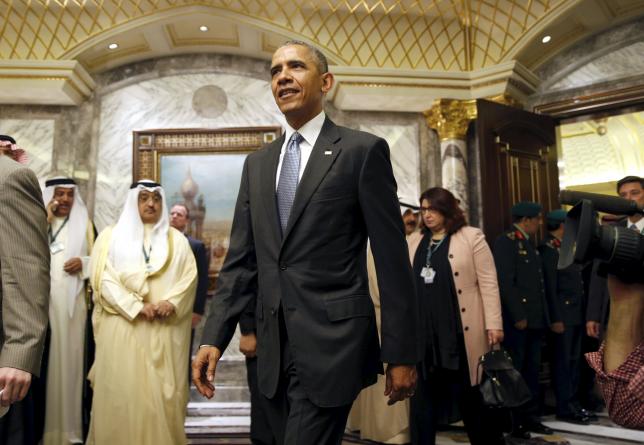Obama starts talks with Gulf leaders aimed at easing strains

RIYADH – US President Barack Obama and Gulf Arab leaders started talks in Riyadh on Thursday at a summit aimed at forging joint action on perceived security threats from Iran and Islamic State, and at ironing out strains in their old alliance.
Obama, who arrived on Wednesday, hopes to allay Gulf countries' fears over Iranian influence and encourage them to douse sectarian tensions in an effort to confront the threat posed by jihadist militants like Islamic State.
Those issues were addressed in his bilateral talks on Wednesday and Thursday with leaders from Saudi Arabia, the United Arab Emirates, Kuwait and Qatar, and will dominate again in the summit which includes the other Gulf Cooperation Council (GCC) members.
The region's crises, including civil wars in Syria, Yemen and Iraq, in which the U.S. and Gulf states have cooperated but still disagree on some issues, are important areas of discussion.
"On the core issues, there’s agreement about where we want to go," Ben Rhodes, Obama's deputy national security adviser, told reporters at a briefing in Riyadh.
He said strains in ties in recent years reflected differences over tactics rather than goals.
"This summit allows us to align our approaches and strategies," he said.
Years of frustration among Gulf countries, aggravated by more recent stumbles, may make Saudi Arabia and its regional allies less receptive to Obama on his fourth and most probably final trip to the kingdom.
The Middle East is mired in a contest for influence between a bloc of mostly Sunni countries, including the conservative, pro-Western Gulf monarchies, and revolutionary Shi'ite Iran and its allies.
Most of the GCC states, which also include Bahrain and Oman, have been bitterly disappointed in Obama's presidency, during which they believe the United States has pulled back from the region, giving more space to Iran.
They were also upset by Obama's remarks in a magazine interview that appeared to cast them as "free-riders" in U.S. security efforts and urged them to "share" the region with Tehran.
Rhodes said a two-hour meeting with Saudi Arabia's King Salman on Wednesday was the longest the two leaders had shared and included a "very open and honest discussion" that included issues which were a source of tension, without specifying them.
"I think they both agreed that it was good to essentially have this opportunity to clear the air," he said.
The American president has said he wants Gulf allies to offer more democratic reforms and improve human rights, and he discussed that with King Salman on Wednesday.
Adding to tensions is a bill proposed in U.S. Congress to lift Riyadh's immunity if any Saudi officials are found to have been involved in the Sept. 11, 2001, attacks. Obama has said he opposes the bill because it could lead to cases directed against the United States in foreign courts.
UNDERLYING STRENGTH
The United States remains deeply enmeshed in Gulf security, cooperating closely with the monarchies to strengthen their armed forces and share intelligence aimed at countering Islamist militant groups.
That underlying strong relationship was underscored in a cartoon published on Thursday in the pan-Arab daily Asharq al-Awsat, owned by King Salman's branch of the Al Saud ruling family.
It showed a Shi'ite cleric in black turban and robes, marked "Iran", sweating with alarm as he read a newspaper headlined "Obama in Riyadh".
All the Saudi newspapers published several pages of photographs of Obama's meetings with Salman and other princes.
In keeping with a noticeably low-key approach by Saudi Arabia's government, however, neither that photo opportunity, nor the GCC meeting's opening statements, were broadcast on live television, as has often been the case before.
The American president is expected to make a statement after the talks at Diriyah Palace before departing for London. –Reuters







